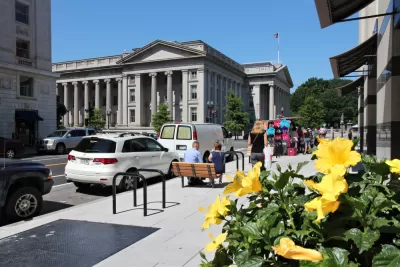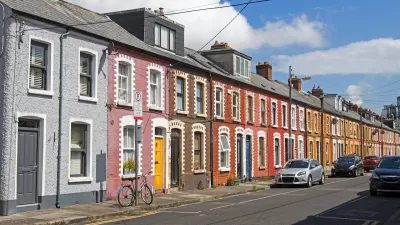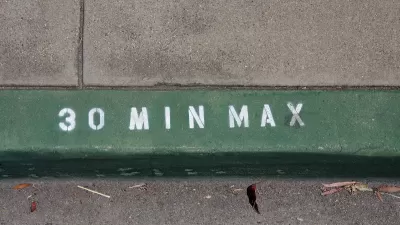Cities are beginning to recognize that effective curb management is an important part of reducing congestion and ensuring equitable use of public space.

The humble curb is becoming a hot commodity as cities scramble to regulate curbside parking and curb usage in the wake of new services and technologies that have made on-demand pickups, deliveries, and micro-mobility options more popular than ever. Writing for Governing, Skip Descant reports on nationwide efforts to regulate curb use and manage congestion.
The city of Aspen, Colorado has established "smart zones" that drivers can book for quick deliveries, creating "a smoother orchestration of goods coming into the city’s small downtown." A Las Vegas project monitors curbside parking and alerts drivers and the city when a vehicle exceeds parking limits. "As these types of projects become more common, data sharing and data standards — like Mobility Data Specifications (MDS) — are needed to better manage public right-of-way spaces, said Regina Clewlow, CEO and founder of Populus."
Curb management initiatives and the "adoption of new digital tools" can help cities keep up with new mobility technologies and manage public space effectively and sustainably, said Clewlow. "Without data, many cities were essentially blind to how their streets, curbs and sidewalks were being used by new fleet services. With data, they’re now empowered to create policies, and more quickly establish new infrastructure that’s cleaner, that’s safer, and that’s more equitable."
FULL STORY: Cities Focus on Urban Curbs and How to Manage Them

Alabama: Trump Terminates Settlements for Black Communities Harmed By Raw Sewage
Trump deemed the landmark civil rights agreement “illegal DEI and environmental justice policy.”

Planetizen Federal Action Tracker
A weekly monitor of how Trump’s orders and actions are impacting planners and planning in America.

The 120 Year Old Tiny Home Villages That Sheltered San Francisco’s Earthquake Refugees
More than a century ago, San Francisco mobilized to house thousands of residents displaced by the 1906 earthquake. Could their strategy offer a model for the present?

In Both Crashes and Crime, Public Transportation is Far Safer than Driving
Contrary to popular assumptions, public transportation has far lower crash and crime rates than automobile travel. For safer communities, improve and encourage transit travel.

Report: Zoning Reforms Should Complement Nashville’s Ambitious Transit Plan
Without reform, restrictive zoning codes will limit the impact of the city’s planned transit expansion and could exclude some of the residents who depend on transit the most.

Judge Orders Release of Frozen IRA, IIJA Funding
The decision is a victory for environmental groups who charged that freezing funds for critical infrastructure and disaster response programs caused “real and irreparable harm” to communities.
Urban Design for Planners 1: Software Tools
This six-course series explores essential urban design concepts using open source software and equips planners with the tools they need to participate fully in the urban design process.
Planning for Universal Design
Learn the tools for implementing Universal Design in planning regulations.
Clanton & Associates, Inc.
Jessamine County Fiscal Court
Institute for Housing and Urban Development Studies (IHS)
City of Grandview
Harvard GSD Executive Education
Toledo-Lucas County Plan Commissions
Salt Lake City
NYU Wagner Graduate School of Public Service





























